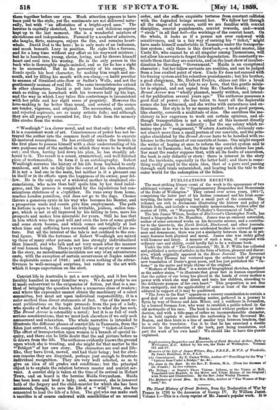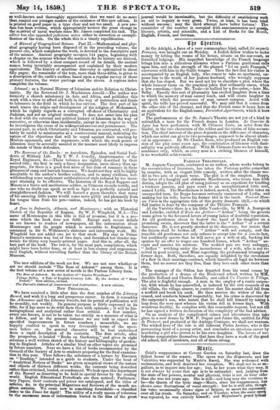PUBLICATIONS RECEIVED.
The most striking library event of the week is the appearance of two additional volumes of the " Supplementary Despatches and Memoranda of the Duke of Wellington." They extend over seven years, 1801-'7,
comprising the latter part of his Indian command and his Irish secre- taryship, the latter supplying but a small part of the contents. The volumes are rich in documents illustrating the history and policy of British India, and include a remarkable memorandum, written after the session of 1806, on " Marquess Wellesley's Government of India." The late James Wilson, brother of Blackwood's Christopher North, has found a biographer in Dr. Hamilton. James was an eminent naturalist, author of some esteemed works on his favourite science, and a contribu- tor to the Quarterly, the North British, Blackwood, and other journals. Very unlike as he was to his more celebrated brother in outward appear- ance and demeanour, there was yet a similarity between them as to pri- mary features both physical and moral. James also was richly gifted with humour and fancy. A memoir of such a man, if composed with ordinary care and ability, could hardly fail to be a welcome book.
Under the title of " The Convalescent," Mr. R. P. Willis has collected
and published a series of articles in the form of letters, pleasant and discur- sive, which originally appeared in the Home Journal. The Reverend John Wesley Thomas has ventured upon the arduous task of giving a new translation of Dante's great poem, and has just published the " In- ferno" in the metre and triple rhyme of the original. " Mothers of Great Men" is a series of biographical sketches, designed as the author states, " to illustrate that great fact in human experience that the author of our being has placed in the hands of every mother a power with which she may direct and train her children, according to the deliberate purpose of her own heart." This proposition is not free from ambiguity, and the applicability of some at least of the instances adduced in support of it may be questioned. "The Jews in the East" appears on a cursory examination to contain a good deal of curious and interesting matter, gathered in a journey to 'Syria by way of Greece and Asia Minor, and a residence in Jerusalem, by a learned German Jew, who went to establish a public school in the old metropolis of his race. The book is issued without preface or intro- duction, and with a title-page of rather an incomprehensible character, for in bold capitals it ascribes the authorship to the Reverend Mr. Beaton, and then hints in a line of smaller type between brackets, that he is only the translator. Can it be that he has exercised a double function in the production of the book, part being translation, and part the work of his own hand ? We should like to have this puzzle explained.
BOOKS.
Supplementary Despatches and Memoranda of Field Marshal Arthur, Duke of Wellington, I.G. Edited by his son, the Duke of Wellington. Volumes III. and IV.
Memoirs of the Life of James Wilson, Esq., F.B.S.B., of Woodville. By James Hamilton, D.D., F.L.S.
the Convalescent. By N. Parker Willis, Author of" Pencillings bythe Way ' " Letters from Under a Bridge," fez. Sec.
The Jews in the East. By the Rev. P. Beaton, M.A. (From the German of Dr. FrankL) In two volumes. The Trilogy : or Dante's Three Visions. Inferno, or the Vision or Hell. Translated into English, in the Metre and Triple Rhyme of the Original with Notes and illustrations. By the Rea. John Wesley Thomas.
The Mothers of Great Men. By Mrs. Ellis, Author of " The Women of Eng- land," The Naval History of Great Britain, from the Declaration of War by France in 1793 to the Accession of George IV. By William James. Volume I.—This is a cheap reprint of Mr. James's popular work. It is so well-known and thoroughly appreciated, that we need do no more than remind our younger readers of the existence of this new edition. It is printed on good paper in a type clear and not too small. A new pre- face has been written, which appropriately notices the great change in the m'teriel of naval warfare since Mr. James completed his task. The editor has also appended judicious notes either in correction or exempli- fication of the text. On the whole this is a timely republication.
A Manual of Geographical Science. Part IL—Mathematical and phy- sical geography having been disposed of in the preceding volume, the present one, which completes the work, is devoted to the descriptive part of the science. Ancient geography occupies 144 pages, beginning with a chapter on the sources whence the materials for its history are derived, which is followed by a clear compact record of its details, the ancient names being invariably accompanied and explained by their modern equivalents. The history of maritime discovery is epitomized in about fifty pages; the remainder of the text, more than three-fifths, is given to a description of the earth's surface, based upon a regular survey of those primary features, the water partings and the rivers. A copious index completes the volume.
Ishmael ; or a Natural History of Islamism and its Relation to Christ- ianity. By the Reverend Dr. J. Muehleisen Arnold.—The author was formerly a church missionary in Asia and Africa, and publishes this work with a view to afford aid both in the way of instruction and funds to labourers in the field in which he has striven. The first part of his work traces the origin and development of the religion of Mohammed, which he rightly regards as a corrupted off-shoot of Christianity and Judaism,, and not an original creation. It does not enter into his plan to deal with the external and political history of Islamism in the way of narrative, or otherwise than incidentally, except in one chapter in which he investigates the cause of its widespread success and permanence. The second part, in which Christianity and Islamism are contrasted, will pro- bably be useful to missionaries as a controversial manual, indicating the nature of the objections that will be urged against their teaching by Moslem opponents, and the arguments with which the weak points of Islamism may be severally assailed in the manner most likely to impress the minds of their defenders.
The Romance of the Ranks : or Anecdotes, Episodes, and Social Inci- dents of Military Life. By T. W. J. Conolly, Quartermaster of the Royal Engineers, &c.—These volumes are rightly described by their second title ; the first is only a fancy designation, more showy than ap- propriate, for there is a good deal more of fun than of romance in these glimpses of camp and barrack humours. We doubt not they will be highly acceptable to the author's brother soldiers, and to many civilians, not- withstanding some unpleasant artificialities of style induced by too inces- sant straining to be effective. The historian of the Royal Sappers and Miners is a brave and meritorious soldier, as Crimean records testify, and one who no doubt can speak as well as fight in a perfectly natural and Straightforward fashion. We will hazard a guess therefore that many of his amusing little yarns would come more glibly and pleasantly from his tongue than from his pen—unless, indeed, he has got his book by -heart.
A Tour in Dalmatia, Albania, and Montenegro ; with an Historical Sketch of the Republic of Ragusa. By W. F. Wingfield, M.A.—The name of Montenegro in this title is full of promise, but it is a pro- mise which the book does not fulfil. Except such recent details as are known to readers of newspapers, all the information about Montenegro and its people which is accessible to Englishmen is contained in Sir G. Wilkinson's elaborate and interesting work. Mr. Wingfield has not added one jot to that stock. His stay in Prince Daniel's territories was but of two days, and furnished but slender ma- terials for thirty very loosely-printed pages. And this is, after all, the hest part of the book. The rest is, for the most part, compilation, which might have been better done, or at least in less clumsy and ungramma- tical English, without travelling further than the library of the British Museum.
The new editions of the week are few. We are not sure whether or not we should include "The Rose of Ashurst" among them. It is the first volume of a new series of novels in the Parlour Library form. The Rose of Ashurst. By the Author of " Emilia Wyndhain."
Tillage Belles. A Tale of English Country Life. By the Author of " Mary Powell." New edition, revised.
The Parent's Cabinet of Amusement and Instruction. A new edition.
NEW PERIODICAL.
We have received a little after date the first number of the Literary Record, and wish it a long and prosperous career. In form it resembles the Atheneum and the Literary Gazette, but its period of publication will be monthly, not weekly. Its general purpose is fairly expressed in its title, for it has more to do with facts than with opinions ; it will be his- toriographical and analytical rather than critical. A first number, every one knows, is not to be taken too strictly as a measure of what is to follow, and in the present instance we are told to expect five specified improvements in future numbers ; meanwhile, we are happily enabled to speak in very favourable terms of the speci- men before us. Its general character will be best understood from a rapid description of its contents. The first article, after the prospectus, is headed "Books on Gardening," and gives in eight columns a well written sketch of the history and bibliography of garden- ing in England. Articles of a similar kind on other topics are promised in future numbers. Next we have a list of books recommended by the Council of the Society of Arts to students preparing for the final examina- tion in this year. Then follows the substance of a lecture by Emerson on " Reading," intended as a guide to students. Under the head of " Analytical Notices of Books" are given synoptical views of the nature and objects of thirteen different works, the contents being described rather than criticised, landed, or condemned. We look upon this department of the Record as deserving to be held in special favour by the reading world. English Educational Periodicals are then noticed; Parliamen- tary Papers, their contents and prices are catalogued, and the titles of articles, &e. in the principal Magazines and Reviews of the month are given seriatim. We come now to something formidable—a classified index to the Times for April! The utility of a ready means of reference to the enormous mass of information buried in the files of the great
journal would be inestimable, but the difficulty of establishing such an aid to inquiry is very great Twice, at least, it has been tried without success ; may the third attempt have better fortune ! The remainder of the number is occupied with announcements and goesin, literary, artistic, and scientific, and a List of Books for the Month; English, French, and German.



























 Previous page
Previous page